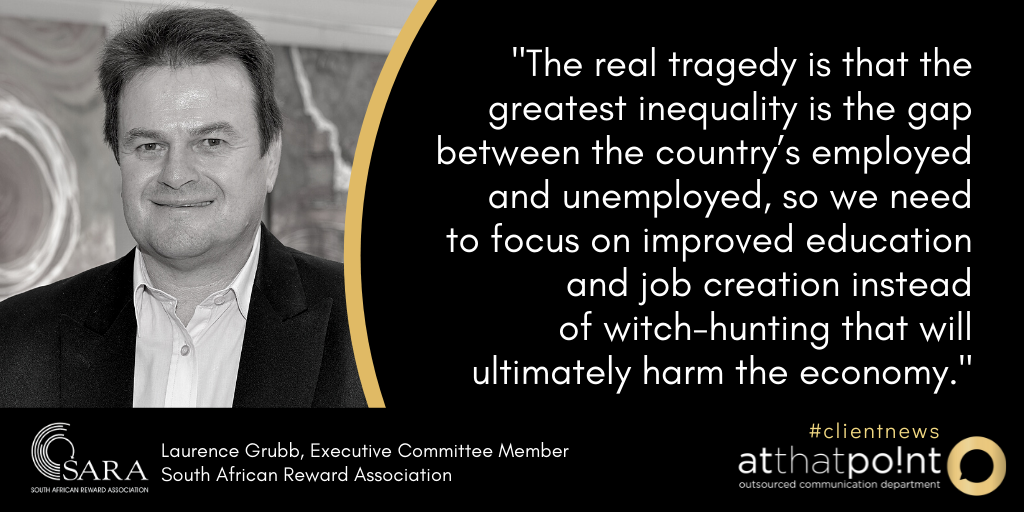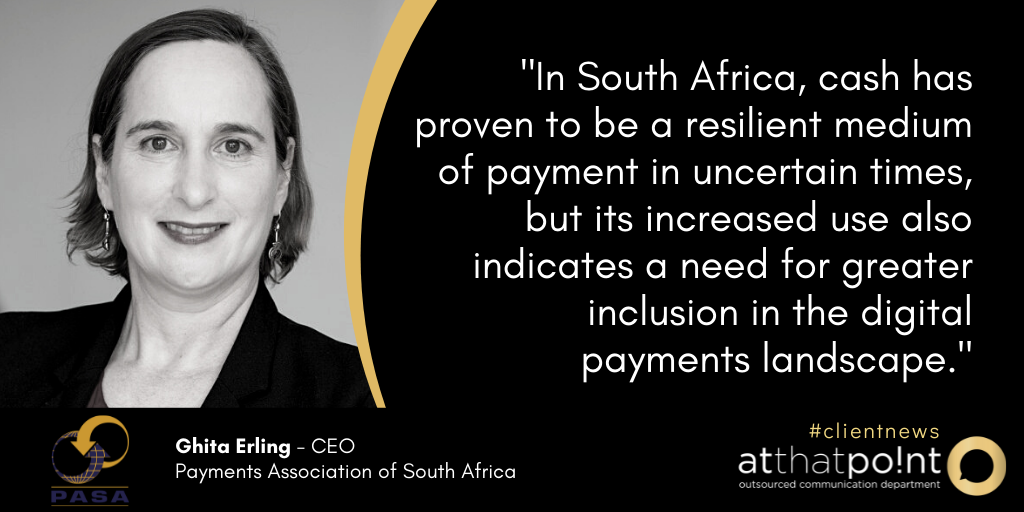 Authored by: Dr Mark Bussin and Laurence Grubb, Executive Committee Members of the South African Reward Association (SARA) While there is a need for greater transparency around executive pay, attempts to regulate the remuneration of corporate leaders will do more harm to the economy than good. It has become accepted as unquestioned fact that CEOs and their executive teams the world over enjoy exorbitant, unregulated remuneration at the expense of lower paid workers. However, reality suggests this is not a pervasive phenomenon and more work must be done to determine the best course of action. Defining excessive pay The first imperative is the need to develop a reasonable language for describing the problem as well as agreed upon metrics to measure its extent. What is meant by excessive? Who exactly is being paid excessively? All executives or a minority who take advantage of their position? One concept is that if, over time, the difference between executive income in an organisation and that of its lowest paid worker increases, excess has occurred. A popular formula for determining this state is the Palma Ratio, which compares the income of the top ten percent highest paid to the bottom 40 percent lowest paid employees. With globalisation, the complexity of doing business is increasing exponentially and the sizes of companies are growing, placing enormous pressure on CEOs and their executive teams. It is only right that they be fairly compensated for their extended responsibilities. In contrast, performance requirements for lowest level workers remain fairly constant while the percentage increase in their pay has been higher than the rest of the staff in a company. Is it not then rational to assume that the difference in earnings between these two levels of responsibility may consequently widen? This is not to deny that there is opportunity for excess and that there are those who will make good use of it. However, sufficient mechanisms already exist to deter this behaviour. The remuneration committee Locally, JSE-listed companies are required to appoint a remuneration committee, comprising only non-executive directors and chaired by an independent non-executive director, that regulates executive pay through a remuneration policy and implementation report. Further, shareholders may cast a non-binding vote either for or against the remuneration policy and implementation report at an organisation’s annual general meeting. While this vote cannot force a company’s management to abandon unsupported executive rewards, we’ve observed that remuneration committees take this indicator seriously and factor the result into their decision making. In addition, shareholders do have a decisive vote on who is appointed as non-executives and what their fees should be. This creates sufficient tension to balance the concerns of the executive team, the remuneration committee and the shareholders themselves. It has been suggested that shareholders should have a binding vote on the remuneration of executives but this is not recommended. Such leverage could allow more powerful shareholders to effectively capture control of the company to their own ends. Their alternative goals need not be insidious to distract the executive team from its obligations to the company and related stakeholders. In a free market, executives must maintain autonomy to make critical decisions that can propel their organisations ahead of competitors. If the shareholders can change the remuneration policy and / or implementation through their votes, then who becomes accountable for the performance of the company? Transparency There is no doubt, though, that transparency on executive remuneration would go a long way to allaying public concerns. Proposed changes to the Companies Act could eventually require a declaration by companies on the income of their executives against the income of their lowest paid workers. Unfortunately, this continues to focus on the size of the pay gap which, as already noted, could result from other factors. The best approach is to link pay back to performance, and remuneration reporting should follow this trend. If the public knows how many jobs were created, what market share was won, or which performance milestones were achieved by a management team, their reward packages become easier to justify. Losing executive talent Most South African executives are in fact paid fairly, in proportion to their achievement of agreed on performance milestones. If lawmakers were to become overly prescriptive of executive pay, they may face losing the very talent that can help reboot the economy. Internationally, South Africans are known as hard, dedicated workers and business leaders are regularly targeted by international executive head-hunters. Faced with restricted earning potential locally, they may easily be tempted to seek their rewards elsewhere. The real pay gap is between the employed and unemployed. It might pay the government to focus more on job creation than limiting the job creators. Because that is what a good executive does. They grow businesses, hire employees, engage suppliers and create an economic effect that ripples all the way down to small businesses and the unemployed. This is more often the reason they earn so well.
0 Comments
Authored by: Dr Mark Bussin (Master Reward Specialist) and Yolanda Sedlmaier (Chartered Reward Specialist), Executive Committee Members of the South African Reward Association (SARA)
Before COVID-19 hit the world, the approach to reward was well defined. Organisations paid their employees a fixed basic salary, plus a set of additional benefits that effectively sweetened the pot. The fixed portion served to ensure workers received an equitable market-related income. The variable portion, on the other hand, extended into performance related rewards such as sales commissions and annual bonuses. Variable pay itself is categorised into two components. Short-term incentives (STIs) are attached to annual performance. Long-term incentives (LTIs), like company shares, are often contingent on employees meeting negotiated performance criteria. At the same time, employers were embracing experiential rewards, like wellness programmes, workplace comfort, flexitime, outstanding performance recognition and other non-financial benefits. The pandemic has turned this model on its head, forcing employers to consider different ways to attract, retain and motivate talented workers, and this without the resources previously at their disposal due to the wide ranging economic impact of the pandemic. How fixed pay has changed There have been no permanent changes in fixed pay policy itself. However, with so many staff being retrenched and businesses closing down, employees are more willing to accept the pay cuts their employers are forced to implement. It is obviously better to have less income than no income at all. What has changed is that employers are offering more options. These could include flexible working hours, paid or unpaid sabbaticals, or reduced hours for reduced pay. Something we are seeing, however, is a global trend towards lower variable pay in exchange for a small increase in monthly fixed pay. This is to provide the security employees need in the short term, although its adoption is not as prevalent in South African boardrooms, although we expect it will be in the near future. How variable pay has changed Variable pay is generally accepted to be that part of the reward package more readily tweaked to motivate employees and encourage better performance from them. Now, with almost all employers struggling to save jobs and keep their doors open, they face limited options. Most have managed to retain basic benefits, like medical aid and retirement funding. What has been more affected is incentives, such as sales commissions, overtime, annual bonuses, and even executive performance bonuses. With the global business slowdown, workers are unable to reach previously achievable targets, so employers aren’t earning the profits needed to reward them. To date, most organisations have been unable to innovate their reward programmes. They’ve been too busy trying to cut costs and negotiating with employees to choose between retrenchments or pay cuts. Unsurprisingly, workers generally opted for a lower salary over the uncertainty that they might be the ones left without a job. Productivity In spite of these dramatic events, many companies report an increase in productivity. This is due to flexible working arrangements allowing employees to save time and money not travelling to the office. It’s also an indicator that employees who are allowed to schedule their own time will do so responsibly. They can start working immediately and will often put in additional hours to make up for time spent on personal tasks. These might include caring for children, home schooling and homecare duties, or transporting them to school and back. Stay-at-home employees also insist they are working longer and harder than ever before. The effect of vaccination on rewards As vaccinations start rolling out in South Africa, we don’t expect this to have a direct or immediate effect on rewards. However, the more South Africans are vaccinated as a society, the quicker employees can return to work full time, and the sooner secondary effects will be realised, like the return of tourists to our shores. As this happens, we can expect a gradual economic recovery that should have a positive effect on employee reward packages. Two main trends In terms of their workforce, employers are focusing on two main concerns. The first is a complete review of their HR policies in relation to dealing effectively with and setting pay for workers who are not located on premises. These new policies are no longer founded on inputs and time spent at the place of business. Instead, they consider the outputs, outcomes and impact of these workers, and how to prepare managers to lead them remotely. The second is that we’re witnessing a major shift towards protecting employees’ mental health and well-being, and assisting them with professional loneliness. As the pandemic drags on, this will doubtless become a key element of every organisation’s reward strategy. ENDS MEDIA CONTACT: Rosa-Mari Le Roux, 060 995 6277, [email protected], www.atthatpoint.co.za For more information on SARA please visit: Website: www.sara.co.za Twitter: @SA_reward LinkedIn: South African Reward Association Facebook: SARA – South African Reward Association |
Archives
March 2023
Welcome to the South African Reward Association newsroom.
Categories
All
|


 RSS Feed
RSS Feed